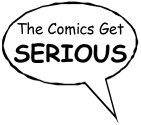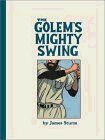The Golem's Mighty Swing. By James Sturm. Montreal: Drawn & Quarterly, 2001. 100p. $12.95. ISBN 1-896597-45-9.
GENRES:
Sports fiction; Jewish fictionAUDIENCE:
Adults, teens, older kids; swearing, racial strifeSYNOPSIS:
In the 1920s, one of the better barnstorming baseball teams is the Stars of David, a nearly all-Jewish team. Although they attract curious onlookers who have never seen Jews before, they're serious about their sport. Their manager/third baseman is Noah Strauss, the Zion Lion, a former Red Sox player before his knees went and he was reduced to this level of team. He's a "hard-nosed sonofabitch" who cares passionately about baseball and takes no nonsense from his team members. As hard as the barnstorming life is, it's superior to that of his father, a sweatshop tailor. The story is told from Noah's POV--he's the narrator. Other characters include Noah's sixteen-year-old brother, Moishe ("Mo"); Stan "The Wire" Weiss; "Buttercup" Lev, their ace pitcher, who likes the bottle too much; and the crown jewel of the team, Henry Bell (a.k.a Hershl Bloom), a former 20-year Negro Leaguer and celebrity among the black baseball fans, crowded into the colored seats.After a sloppy victory against Michigan's Forest Grove Spartans (where the townsfolk come largely to see the exotic Jews), the team splits up to eat, rest, or otherwise relax. Noah, Mo, and Wire have dinner at a small restaurant on Main Street (they're put in the back). Mo is sulking because of a bad call against him, and Noah is entirely unsympathetic, so Mo leaves the restaurant and goes walking along the outskirts of town. Several kids see him and decide to throw rocks at him to knock his baseball cap off in order to see his horns. [If you don't get this, it's because a mistranslated passage in the Bible said that Jews have horns, and for centuries people believed it. In fact, some still do. Morons.] Of course, they hit him instead, and he runs screaming after them. One kid runs right into a fruit stand, knocking things over, then accusing the Jew of chasing him. Luckily, the adults there are more inclined to talk baseball with Mo than beat him up.
Back at the restaurant, Noah and Wire are approached by Victor Paige, a representative of a PR firm that deals with baseball teams. Victor has an idea to double the amount of money that the Stars of David make--he wants to dress Henry Bell up as a golem. Noah decries the use of gimmickry in baseball and refuses. That night on the bus, however, Henry talks about the gimmicks used by various Negro League teams that he faced; he's perfectly willing to play the golem. Still, Noah refuses, though the team is desperately short of money--especially after their next game in Cedar Falls. A fair had arrived the day before and is leeching precious dollars out of the citizens' baseball pockets. In addition, Honus Wagner's All-Stars are coming next weekend, further keeping the crowds away from the Stars' game. When their bus dies, that's it; Noah calls Victor.
Flash forward a few months. Henry as the golem is a big hit. But now the team is playing the All-Americans in the relatively large town of Putnam--and Putnam is not a town that likes Jews. While the others lounge in their seedy hotel rooms on the outskirts of town, Buttercup hitches a ride into town to get a drink. He doesn't return, and the next morning, the other Stars wait for him until he finally staggers back, bruised and beaten. The Stars strongly feel that they shouldn't play the game (much to Victor's annoyance), but Henry shames them into it by recounting a season with the Black Barons where, before training camp had even ended, three of his teammates had been killed by racists, yet they still played.
The All-Americans have a pretty impressive lineup, but the Stars are their equals. Then, as Mo chases a foul ball near the stands, he's pulled in by angry fans (who have been riled up by a nasty editorial in the local paper). The men there beat him up and steal his glove before dumping him back onto the field. Noah and the umpire argue over the ump's refusal to call this interference, and the fans start chanting "Jews go home." But the game continues. With the tension level already high, the All-Americans come up to bat. Henry, the pitcher (in full golem outfit), plunks the batter in the head... and a riot erupts. As the rest of the Stars crowd into the dugout, Henry defends them with his "mighty swing"--he has a baseball bat, and he's a fearful enough sight that the crowd holds off. But he can't last forever, and how are the Stars to survive this game?
EVALUATION:
Quite a nifty little book, illuminating as it does several aspects of early twentieth century American culture: semi-pro barnstorming baseball teams, anti-Semitism and simple-minded beliefs about Jews, and small towns. (Although there is a little bit about prejudice against blacks, that's more of a "felt" attitude than one that takes center stage.) The characters are complex and believable. Noah is a stern leader, concerned about baseball and the team's funds, Jewish by birth and "vocation" but perfectly ready to play on the Sabbath, swear, smoke, and otherwise detach himself from his father's roots. Mo is also complex, a youngster with a decent amount of bravery (continuing to play after being hauled into the stands demonstrates that), a real talent for baseball, and inner depths that readers can barely glimpse because Noah, as the narrator, is not capable of recognizing them. Henry is a big, jolly guy, an outstanding player with an endless fund of stories from his Negro League days, loyal and brave. While he obviously loves baseball, he's perfectly willing to do anything that'll put more money into his pocket. Invariably, when the Stars travel to a town, he's feted by the black community while the rest of the team has to make do. Victor's a bit of a stereotype, the classic ad-man sharpie. He's so shallow that he has no sympathy whatsoever for what happened to Buttercup; he speaks instead of money that has been spent and lawsuits if the game doesn't go on.The baseball rings true; it's always nice to read something by someone who knows what he's talking about. Another thing I really enjoyed was that the golem symbolism was carried to a logical conclusion. After the Stars escape Putnam, Noah reflects that "I don't blame Paige for what happened. He told me he intended to create a golem, and I agreed to help him. It is no surprise that things got out of hand. That is the nature of a golem." There is also a sense that survival itself is a victory--very Jewish! Those were very satisfying concluding sentiments.
Unfortunately, that's not where the book ended. There is a short postscript section, ten years later, in which Noah, no longer barnstorming, reflects on where the others are now. He takes in a game between the "Big Leagues" and the "Hayseeds," promoted, of course, by Victor. Gimmickry has now fully pervaded semipro ball, and Noah is disgusted, especially when the Hayseeds' mascot, "Moonshine Mullins," an obvious drunk, comes onto the field and disrupts the game. But because his drunken antics were obviously not scripted, as so much of the game itself had been, Noah decides to "sit back down. I am curious to see how it all plays out." These are the closing lines of the book, but they don't feel like closing lines--I can't be the only person who turned the page, expecting to read more. I guess these lines were supposed to indicate that Noah was reluctantly beginning to enjoy gimmickry, but they fail miserably at ending a book. How did that incident play out? Does Noah recognize that his standards are slipping? Does he have any philosophical summation of his life, baseball, anything? I really wish Sturm had ended the book at the end of the Putnam fiasco.
I also would've liked to see at least some acknowledgement of the irony that while Noah decried gimmickry in baseball, the Stars of David relied on that very same thing to draw onlookers. If nothing else, there could have been a distinction drawn between the Stars' nonintrusive "off-field" gimmickry and the intrusive "on-field" antics.
The black-and-white art is simple and clean and never detracts from the story. Indeed, this book is an excellent example of how a simple style can carry a story better than glitzy, detailed art that draws too much attention to itself. (Of course, stories that use art like that are too often not worth reading.)
In spite of its weak ending, The Golem's Mighty Swing is a great read and will hold appeal for a diverse audience: baseball fans and readers interested in the American Jewish or black experiences, as well as people who enjoy good fiction and graphic novels. Note that the book may be too intense for younger kids, what with the swearing and hatred--Too Many Time Machines, while an inferior work, is a more appropriate baseball-related title for the K-6 set.
Copyright 2001, D. Aviva Rothschild Comments? Return to The Comics Get Serious main page Return to Rational Magic Current Issue Return to Rational Magic Home


